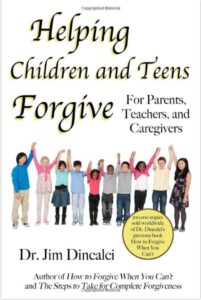
Decades of research and centuries of religious teaching support that forgiveness can help heal upsets and trauma of the past and enjoy better mental, physical, and spiritual well-being now and in the future.
This book aims to help anyone empower children and teens:
- to find more joy and inner peace in their lives by letting go of painful upsets. And
- to learn ways to calm down when tense and upset
Help your child or teen:
- Let go of new and old hurts, and feel better,
- Deal with forgiveness issues and
- Move forward into the future unencumbered by the weight of resentment, guilt, and hurt.
Dr. Dincalci draws on decades of extensive research on Adverse Childhood Experiences and highlights the role forgiveness plays in living through adversity and finding resilience during difficult circumstances. Perhaps most importantly, he offers some excellent resources to help facilitate forgiveness. The methods he offers are tried-and-true and scientifically supported techniques for helping a child learn to forgive.
His book utilizes brain studies and includes dealing with trauma, tragedy, and abuse. It is also helpful for therapists, counselors, medical professionals, pastors, and ministers.
There is not another book like it on helping children or teens forgive.
Research Shows Us
Forgiveness is widely addressed in research because of its social desirability and many positive life outcomes across all developmental periods that children and adolescents go through. Research shows that forgiveness is a prerequisite for
- decreasing anger,
- initiating reconciliation,
- facilitating interpersonal relationships, and
It helps your child with
- depression and anxiety,
- introversion,
- aggressiveness and hostility,
- positive mental health and well-being.
Research analysis through the years reports that forgiveness points to many positive personality traits, like:
- Agreeableness
- Conscientiousness
- Emotion Management
- Emotional Stability
- Compassionate understanding
Studies show that forgiveness will help children acquire skills in (a)pro-social behaviors, (b) moral development, (c) dealing with aggressive behaviors and conflicts, (d) cooperation and team building.
About the Author
Psychotherapist Dr. Jim Dincalci brings 50 years of work in counseling. In 1993, he had a personal forgiveness transformation. Since then, he has presented his forgiveness work at international and national conferences, including the Campaign for Forgiveness Research in 2003 and two Rotary World Peace Conferences. He’s given trainings at hospitals, schools, churches, counseling agencies, and semester courses on forgiveness at several universities, plus teaching seminars in “Helping Children Forgive.”
Nobel Peace Prize winner, Archbishop Desmond Tutu, acknowledged Dr. Jim for his contribution to his latest forgiveness book, and Jim’s spending “over twenty-five years counseling and teaching people who are struggling to forgive.”
He has worked as a Clinical Therapist for ages 5-18 for the Hawaii Department of Education, three years facilitating Anger Control groups for men and teens, three years in Drug and Alcohol rehab, and three years, working against Human Trafficking in Northern Florida.
He’s trained in Trauma-Informed Care. His last work until Covid-19 was teaching “Resolving Resentment, Conflicts, and Stress” for men and women at the Leon County Jail in Florida. He worked for 1 1/2 years at a re-entry program for ex-offenders and a year with Drug and alcohol abusers.
He is the founder and director of the Forgiveness Foundation International, established in 2001.
His first book now in its 4th edition, How to Forgive When You Can’t, is published in nine languages, has four national awards, and sold 100,000 copies worldwide. He also has a newly published book, The Steps to Take for Complete Forgiveness: a Workbook.
In all three books, he integrates his years of studying effective thought and emotional processes of psychology, sociology research, neuroscience, world religions, and inspirational viewpoints that all aid in forgiving.
